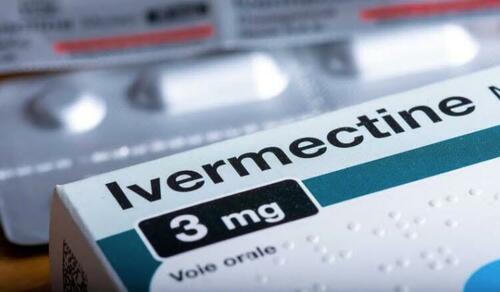
Authored by David Henderson and Charles Hooper via The Brownstone Institute,
The COVID-19 pandemic brought us a panoply of lies and evidence-light declarations that were less intended to inform Americans than to consolidate power and buy time. Among these were Anthony Fauci’s famous shift from arguing against wearing masks, to recommending wearing one, and, finally, to wearing two.
Fauci also tried to convince us that the SARS-CoV-2 virus was not manipulated in a lab even though his inner circle had emailed him about “unusual features” of the virus that looked “potentially engineered.” And, of course, we had “fifteen days to stop the spread,” an evergreen concept that dragged on for two years. Lest readers fault us for forgetting, there was also the “gain of function” controversy, the focused protection battle, school closures, lockdowns, vaccine mandates, and vaccine misrepresentations.
These topics have received much public attention. The one pandemic topic that hasn’t, and is nonetheless important, is the maligned ivermectin. It’s time to set the record straight.
If you’ve followed the news closely over the last two years, you’ve probably heard a few things about ivermectin.
-
First, that it’s a veterinary medicine intended for horses and cows.
-
Second, that the FDA and other government regulatory agencies recommended against its use for COVID-19.
-
Third, that even the inventor and manufacturer of ivermectin, Merck & Co., came out against it.
-
Fourth, that one of the largest studies showing that ivermectin worked for COVID-19 was retracted for data fraud.
-
And, finally, that the largest and best study of ivermectin, the TOGETHER trial, showed that ivermectin didn’t work.
Let’s consider the evidence.
Ivermectin has a distinguished history, and it may have benefits comparable to those of penicillin. The anti-parasitic’s discovery led to a Nobel Prize and subsequent billions of safe administrations around the world, even among children and pregnant women. “Ivermectin is widely available worldwide, inexpensive, and one of the safest drugs in modern medicine.”
The FDA put out a special warning against using ivermectin for COVID-19. The FDA’s warning, which included language such as, “serious harm,” “hospitalized,” “dangerous,” “very dangerous,” “seizures,” “coma and even death,” and “highly toxic,” might suggest that the FDA was warning against pills laced with poison, not a drug the FDA had already approved as safe. Why did it become dangerous when used for COVID-19? The FDA didn’t say.
Because of the FDA’s rules, if it were to make any statement on ivermectin, it was obliged to attack it. The FDA prohibits the promotion of drugs for unapproved uses. Since fighting SARS-CoV-2 was an unapproved use of ivermectin, the FDA couldn’t have advocated use without obvious hypocrisy. Ivermectin’s discoverer, Merck & Co., had multiple reasons to disparage its own drug.
Merck, too, couldn’t have legally “promoted” ivermectin for COVID-19 without a full FDA approval, something that would have taken years and many millions of dollars. Plus, Merck doesn’t make much money from cheap, generic ivermectin but was hoping to find success with its new, expensive drug, Lagevrio (molnupiravir).
A large study of ivermectin for COVID-19 by Elgazzar et al. was withdrawn over charges of plagiarism and faked data. Many media reports seem fixated on this one dubious study, but it was one of many clinical studies. After the withdrawn studies have been removed from consideration, there are 15 trials that suggest that ivermectin doesn’t work for COVID-19 and 78 that do.
The TOGETHER trial received significant positive press. The New York Times quoted two experts who had seen the results. One stated, “There’s really no sign of any benefit [from ivermectin],” while the other said, “At some point it will become a waste of resources to continue studying an unpromising approach.”
While the Elgazzar paper was quickly dismissed, the TOGETHER trial was acclaimed. It shouldn’t have been. Researchers who have analyzed it have found 31 critical problems (impossible data; extreme conflicts of interest; blinding failure), 22 serious problems (results were delayed six months; conflicting data), and 21 major problems (multiple, conflicting randomization protocols) with it.
While the popular narrative is that the TOGETHER trial showed that ivermectin didn’t work for COVID-19, the actual results belie that conclusion: ivermectin was associated with a 12 percent lower risk of death, a 23 percent lower risk of mechanical ventilation, a 17 percent lower risk of hospitalization, and a 10 percent lower risk of extended ER observation or hospitalization. We have calculated that the probability that ivermectin helped the patients in the TOGETHER trial ranged from 26 percent for the median number of days to clinical recovery to 91 percent for preventing hospitalization. The TOGETHER trial’s results should be reported accurately.
Based on the clinical evidence from the 93 trials that ivermectin reduced mortality by an average of 51 percent, and on the estimated infection fatality rate of COVID-19, about 400 infected Americans aged 60-69 would need to be treated with ivermectin to statistically prevent one death in that group. The total cost of the ivermectin to prevent that one death: $40,000.
(Based on the GoodRx website, a generic prescription for ivermectin is priced at approximately $40. Roughly 2.5 prescriptions would be needed per person to receive the average dose of 150 mg per patient.)
How much is your life worth? We’re betting it’s worth far more than $40,000.
When the next pandemic strikes, by necessity we’ll rely on older drugs because newer ones require years of development. Ivermectin is a repurposed drug that helps, and could have helped so much more. It deserves recognition, not disparagement. What we really need, however, is a way to inoculate ourselves against the lies and misrepresentations of powerful public figures, organizations, and drug companies. Sadly, there are no such vaccines for that contagion.
Authored by David Henderson and Charles Hooper via The Brownstone Institute,
The COVID-19 pandemic brought us a panoply of lies and evidence-light declarations that were less intended to inform Americans than to consolidate power and buy time. Among these were Anthony Fauci’s famous shift from arguing against wearing masks, to recommending wearing one, and, finally, to wearing two.
Fauci also tried to convince us that the SARS-CoV-2 virus was not manipulated in a lab even though his inner circle had emailed him about “unusual features” of the virus that looked “potentially engineered.” And, of course, we had “fifteen days to stop the spread,” an evergreen concept that dragged on for two years. Lest readers fault us for forgetting, there was also the “gain of function” controversy, the focused protection battle, school closures, lockdowns, vaccine mandates, and vaccine misrepresentations.
These topics have received much public attention. The one pandemic topic that hasn’t, and is nonetheless important, is the maligned ivermectin. It’s time to set the record straight.
If you’ve followed the news closely over the last two years, you’ve probably heard a few things about ivermectin.
-
First, that it’s a veterinary medicine intended for horses and cows.
-
Second, that the FDA and other government regulatory agencies recommended against its use for COVID-19.
-
Third, that even the inventor and manufacturer of ivermectin, Merck & Co., came out against it.
-
Fourth, that one of the largest studies showing that ivermectin worked for COVID-19 was retracted for data fraud.
-
And, finally, that the largest and best study of ivermectin, the TOGETHER trial, showed that ivermectin didn’t work.
Let’s consider the evidence.
Ivermectin has a distinguished history, and it may have benefits comparable to those of penicillin. The anti-parasitic’s discovery led to a Nobel Prize and subsequent billions of safe administrations around the world, even among children and pregnant women. “Ivermectin is widely available worldwide, inexpensive, and one of the safest drugs in modern medicine.”
The FDA put out a special warning against using ivermectin for COVID-19. The FDA’s warning, which included language such as, “serious harm,” “hospitalized,” “dangerous,” “very dangerous,” “seizures,” “coma and even death,” and “highly toxic,” might suggest that the FDA was warning against pills laced with poison, not a drug the FDA had already approved as safe. Why did it become dangerous when used for COVID-19? The FDA didn’t say.
Because of the FDA’s rules, if it were to make any statement on ivermectin, it was obliged to attack it. The FDA prohibits the promotion of drugs for unapproved uses. Since fighting SARS-CoV-2 was an unapproved use of ivermectin, the FDA couldn’t have advocated use without obvious hypocrisy. Ivermectin’s discoverer, Merck & Co., had multiple reasons to disparage its own drug.
Merck, too, couldn’t have legally “promoted” ivermectin for COVID-19 without a full FDA approval, something that would have taken years and many millions of dollars. Plus, Merck doesn’t make much money from cheap, generic ivermectin but was hoping to find success with its new, expensive drug, Lagevrio (molnupiravir).
A large study of ivermectin for COVID-19 by Elgazzar et al. was withdrawn over charges of plagiarism and faked data. Many media reports seem fixated on this one dubious study, but it was one of many clinical studies. After the withdrawn studies have been removed from consideration, there are 15 trials that suggest that ivermectin doesn’t work for COVID-19 and 78 that do.
The TOGETHER trial received significant positive press. The New York Times quoted two experts who had seen the results. One stated, “There’s really no sign of any benefit [from ivermectin],” while the other said, “At some point it will become a waste of resources to continue studying an unpromising approach.”
While the Elgazzar paper was quickly dismissed, the TOGETHER trial was acclaimed. It shouldn’t have been. Researchers who have analyzed it have found 31 critical problems (impossible data; extreme conflicts of interest; blinding failure), 22 serious problems (results were delayed six months; conflicting data), and 21 major problems (multiple, conflicting randomization protocols) with it.
While the popular narrative is that the TOGETHER trial showed that ivermectin didn’t work for COVID-19, the actual results belie that conclusion: ivermectin was associated with a 12 percent lower risk of death, a 23 percent lower risk of mechanical ventilation, a 17 percent lower risk of hospitalization, and a 10 percent lower risk of extended ER observation or hospitalization. We have calculated that the probability that ivermectin helped the patients in the TOGETHER trial ranged from 26 percent for the median number of days to clinical recovery to 91 percent for preventing hospitalization. The TOGETHER trial’s results should be reported accurately.
Based on the clinical evidence from the 93 trials that ivermectin reduced mortality by an average of 51 percent, and on the estimated infection fatality rate of COVID-19, about 400 infected Americans aged 60-69 would need to be treated with ivermectin to statistically prevent one death in that group. The total cost of the ivermectin to prevent that one death: $40,000.
(Based on the GoodRx website, a generic prescription for ivermectin is priced at approximately $40. Roughly 2.5 prescriptions would be needed per person to receive the average dose of 150 mg per patient.)
How much is your life worth? We’re betting it’s worth far more than $40,000.
When the next pandemic strikes, by necessity we’ll rely on older drugs because newer ones require years of development. Ivermectin is a repurposed drug that helps, and could have helped so much more. It deserves recognition, not disparagement. What we really need, however, is a way to inoculate ourselves against the lies and misrepresentations of powerful public figures, organizations, and drug companies. Sadly, there are no such vaccines for that contagion.
Loading…







